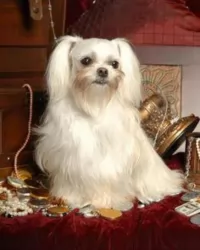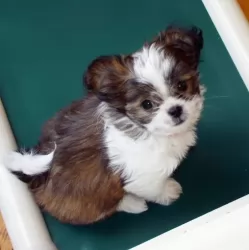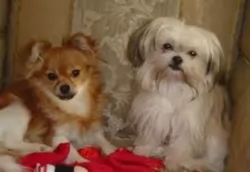 MyDogBreeds
MyDogBreeds Toy Mi-Ki is originated from United States but East European Shepherd is originated from Russia. Toy Mi-Ki may grow 46 cm / 18 inches shorter than East European Shepherd. Toy Mi-Ki may weigh 45 kg / 99 pounds lesser than East European Shepherd. Both Toy Mi-Ki and East European Shepherd has almost same life span. Toy Mi-Ki may have less litter size than East European Shepherd. Both Toy Mi-Ki and East European Shepherd requires Moderate maintenance.
Toy Mi-Ki is originated from United States but East European Shepherd is originated from Russia. Toy Mi-Ki may grow 46 cm / 18 inches shorter than East European Shepherd. Toy Mi-Ki may weigh 45 kg / 99 pounds lesser than East European Shepherd. Both Toy Mi-Ki and East European Shepherd has almost same life span. Toy Mi-Ki may have less litter size than East European Shepherd. Both Toy Mi-Ki and East European Shepherd requires Moderate maintenance.
 The Toy Mi-Ki is a sociable companion dog. He hasn’t got a long history, and the little bit of history there is, isn’t clear.
The Toy Mi-Ki is a sociable companion dog. He hasn’t got a long history, and the little bit of history there is, isn’t clear.
It is believed that the breed was bought about by Maureen Westburg. It was in the 1980s that she crossed several toy breeds to develop the Mi-Ki. It is thought that she gave the dog the name Mi-Ki because her name was Mikkie. It seems whe wanted a dog that came close to looking like a gremlin.
Some of the dogs used in the breeding program were the Japanese Chin, the Maltese, and the Papillon. The International Miki Registry is trying to get recognition with the United Kennel Club for this dog. There are other canine clubs and organizations that recognize the Mi-Ki Dog as a breed.
 The East European Shepherd is a dog which hails from Russia. The dog was developed in the 1930-1950s as there was a need for a bigger, more robust, weather-resistant type of dog who would perform all kinds of guard duties in the Soviet Union.
The East European Shepherd is a dog which hails from Russia. The dog was developed in the 1930-1950s as there was a need for a bigger, more robust, weather-resistant type of dog who would perform all kinds of guard duties in the Soviet Union.
This is a rare dog breed, created by mixing Russian breeds such as the Laika, Central Asian Shepherd and Caucasian Shepherd to create a strong working dog that could cope well with the sub-freezing conditions.
The standard breed type was established in 1964. The only major kennel club to grant full recognition to the East-European Shepherd is the Russian Kennel Club. In the United States, the dog is recognized by a number of rare breed registries.
 The small Toy Miki stands at between 25 cm – 30 cm in height and weighs between 2 – 5kg. You get two different coat types – long and short and the long-haired variety also has quite a bit of hair around the face.
The small Toy Miki stands at between 25 cm – 30 cm in height and weighs between 2 – 5kg. You get two different coat types – long and short and the long-haired variety also has quite a bit of hair around the face.
His longish coat is low-shedding which makes him popular for people who battle with allergies. The Miki Dog will produce about 2 – 4 puppies.
As a toy dog, he has a domed head with large eyes. Their ears are feathered and are carried erect and the tail is long and feathered.
These little dogs are popular companion dogs and they’re intelligent and loving, making the ideal pet for anyone.
It’s a friendly dog and yet he will bark to alert you of an intruder. Youll take notice because he isn’t the kind of dog that just yaps away.
Children love them and they make great playmates for children who have been taught to be kind and gentle with animals.
Their small size and their adaptable nature make them suitable for city or country living. Sweet and amicable, the social purebred Toy Mi-Ki is everything you want in a companion.
He is loyal and devoted, calm and adaptable. They’re not the kind of dogs to go jogging with you, but nonetheless, he will still need his exercise – walks every day as well as ball games.
 The East European Shepherd is larger than a German Shepherd. He is described as a large dog with males and females standing roughly at 66-76 centimeters at the withers and weighing anything between 30–50kg.
The East European Shepherd is larger than a German Shepherd. He is described as a large dog with males and females standing roughly at 66-76 centimeters at the withers and weighing anything between 30–50kg.
The coat with undercoat is medium in length with the standard color being black-and-tan or black-and-red. The dog is solid colored or is light fawn or tan in color with black saddle.
The face of the dog is black and he looks a lot like a wolf in appearance. The ears of the East European Shepherd are medium sized and always erect.The tail is long and hangs low.
The East European Shepherd is an intelligent and confident dog and can be aggressive when aggravated. He is a working dog and to get along with other pets in the home as well as children, the East European Shepherd will need to be trained and socialized, becoming obedient and loyal with his owner.
He is an intelligent dog and training him poses no problem. Loyal and devoted, this dog mostly becomes particularly attached to one member of the family.
There are a number of dog experts who don’t recommend the dog as a family pet as it is a dog reluctant to form a close bond with a child, being irritated by them, especially ill disciplined children.
It is a strong-willed dog too and shouldn’t be the first dog choice for a novice dog owner. They make excellent guard dogs and take their role as protector of the family seriously.
 The Mi-Ki is calm and good-natured, and because of his cuteness, he can’t help but become a lap dog, if you allow him.
The Mi-Ki is calm and good-natured, and because of his cuteness, he can’t help but become a lap dog, if you allow him.
He is social and just loves human companionship. He is friendly too and will quite happily be friends with children and pets in the home.
Make sure he is trained and socialized so that you become one of the many people who have nothing but good things to say about this sweet little dog.
 The East-European Shepherd dogs are balanced, confident, intelligent, loving and playful while also being tough and protective of their owners.
The East-European Shepherd dogs are balanced, confident, intelligent, loving and playful while also being tough and protective of their owners.
They make fantastic guard dogs, becoming aggressive around strangers whom they don’t trust. When you bring a dog like this into the home, it is essential to have him trained and socialized and to also have a firm owner who can deal with such a strong-willed animal.
He is an active, alert dog who will require regular exercise and will slot into life in the city or in the country so long as his exercise needs are met.
When you look after your East European Shepherd you’ll find in him a devoted, loyal friend who will protect you with his life.
 You just have to bear in mind, that because of his short muzzle, he is prone to respiratory problems. Too much exercise and you may find him huffing and puffing. Be careful on a hot day.
You just have to bear in mind, that because of his short muzzle, he is prone to respiratory problems. Too much exercise and you may find him huffing and puffing. Be careful on a hot day.
Also, little dogs like this often have all kinds of dental problems. When you brush him, check his teeth because he can’t tell you if he has a rotten tooth causing him a lot of pain and misery.
Check his eyes too that they are bright and clear and check the inside of his ears. Hypothyroidism and eye issues can also bother the Mi-ki.
 Regarded as a tough dog who can reach 10 – 12 years of age, the East European Shepherd is prone to hip or elbow dysplasia. This is a a disease that is more prevalent with German Shepherd type dogs.
Regarded as a tough dog who can reach 10 – 12 years of age, the East European Shepherd is prone to hip or elbow dysplasia. This is a a disease that is more prevalent with German Shepherd type dogs.
Dysplasia is a genetic condition which can lead to inflammation and arthritis and even lameness. Unfortunately it can happen with young dogs too, and the vet will suggest different types of treatment which can include surgery.
Degenerative myelopathy is another degenerative disease which can be found with the East European Shepherd. It is a fatal, progressive degenerative disease of the spinal cord. Unfortunately there isn’t treatment for the disease, leading to paralysis of the limbs.
 Considered to be low-shedding, the Mi-Ki will benefit from a brush once or twice a week.
Considered to be low-shedding, the Mi-Ki will benefit from a brush once or twice a week.
Some people take their Mi-Ki’s to have their hair professionally cut. This is a good move because then the ears, teeth, and nails are attended to as well.
You can do all of these things at home yourself, but sometimes, particularly with the long-haired Miki, the matting of the hair can make it that you rather send him to professional groomers.
Like all dogs, the Mi-Ki dog will need nutritious food if he is to stay healthy. He isn’t a big eater and you will find the perfect food for your small canine pet.
Read on the packaging to make sure you get high-quality dry food for small dogs. You want the ingredients to be as natural as possible without any toxic colorants and additives.
Meat and protein must always be the top ingredients. Try to provide some home-made food too. Boiled chicken, brown rice, spinach, and sweet potatoes can be chopped up finely and a small portion added occasionally to the dry kibble as a tasty treat.
 The coat of the East European Shepherd is thick, and while he won’t require any professional grooming, he will require being brushed at least twice a week. This is because he sheds heavily at certain times.
The coat of the East European Shepherd is thick, and while he won’t require any professional grooming, he will require being brushed at least twice a week. This is because he sheds heavily at certain times.
His nails will need to be clipped if they don’t wear down naturally, and his teeth will require regular brushing at least 2 or 3 times a week. Fortunately, because his ears are large and open, he doesn’t easily get an ear infection.
The East European Shepherd is a dog which has always been worked. It is a highly energetic dog and its role as a guard- and herding dog has made it that the dog will require a good dose of exercise.
A long walk may not be enough for this active dog, and he will require intense ball throwing with a tennis racquet to get the ball far away so that he can run far to fetch the ball. Without enough exercise, the East-European Shepherd will develop behavioral problems which will include aggression.